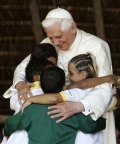“Europe would no longer be Europe” if the basic cell of the marriage “disappears or is transformed”, said Pope Benedict has said. 
Speaking yesterday, in receiving the new Hungarian ambassador to the Holy See, Mr. Gábor Gyriványi, he said that he hoped the new Hungarian Constitution would be inspired by Christian values, especially regards “the position of marriage and the family in society.”
The characteristics of marriage, notably fidelity and sacrifice, had “given Europe its particular aspect and its humanism,” he said.
The Pope added: “Europe would no longer be Europe if such a basic cell of society disappeared or were substantially transformed.”
And he pointed to the threats posed to marriage by more liberal divorce laws and by alternative family structures.
Pope Benedict said: “We all know how much risk marriage and the family run today — on one hand, because of the erosion of its most profound values of stability and indissolubility, because of a growing liberalisation of the right of divorce, and of the custom, increasingly widespread, of man and woman living together without the juridical form and protection of marriage, on the other, because of the different types of union which have no foundation in the history of the culture and of the law in Europe.”
The Church could not approve “of legislative initiatives that involve the enhancement of alternative models of married life and family,” he said
These models contribute to “the weakening of the principles of natural law and thus to the relativisation of law,” as well as to the weakening of “awareness of society’s values”.
Reason, he said, is in a position “to guarantee equality among men” but “fails to establish fraternity,” which in a sense – points out the Pope – “is the other side of freedom and equality. ” “It opens us up to altruism, civic duty, attention to the other.”
Pope Benedict also recalled the recent history of Hungary, after the Second World War, marked by the tragic experience of a communist regime. He expressed the hope that “the deep wounds of the materialistic view of man” may continue “to heal in a climate of peace, freedom and respect for human dignity.”